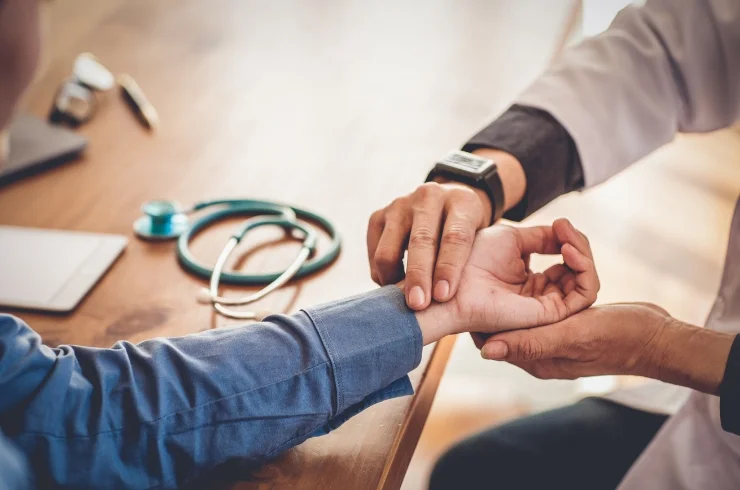In today’s fast-paced world, health monitoring has become more convenient than ever, thanks to advancements in wearable technology and home healthcare services. A Full Body checkup at home Dubai offers comprehensive health insights without the need for hospital visits, and when combined with wearable devices, it provides continuous, real-time data for better health management. This article explores how wearable devices enhance the effectiveness of at-home full body checkups, ensuring proactive and personalized healthcare.
The Rise of Home Health Monitoring
Gone are the days when health checkups required long hospital queues and multiple appointments. With the increasing demand for convenience, Full Body checkup at home services have gained popularity, allowing individuals to assess their health in a comfortable environment. These checkups typically include blood tests, vital sign measurements, and other diagnostic procedures performed by trained professionals.
How Wearable Devices Enhance At-Home Health Checkups
Wearable devices, such as smartwatches, fitness bands, and medical-grade wearables, provide continuous health tracking, filling the gaps between periodic full body checkups. Here’s how they complement at-home diagnostics:
Continuous Health Tracking
Unlike a Full Body checkup at home, which provides a snapshot of health at a specific time, wearables offer 24/7 monitoring. They track heart rate, sleep patterns, physical activity, and even blood oxygen levels, helping detect irregularities early.
Real-Time Data for Better Analysis
Wearables sync with mobile apps, allowing users and healthcare providers to monitor trends over time. This data can be shared during a Full Body checkup at home, giving doctors a more comprehensive view of a patient’s health.
Early Detection of Potential Issues
Abnormalities like irregular heartbeats, sudden blood pressure spikes, or inconsistent sleep patterns can be flagged by wearables. Early detection means timely intervention, reducing the risk of severe health complications.
Key Health Metrics Tracked by Wearables
Wearable devices monitor several critical health parameters that align with the diagnostics covered in a Full Body checkup at home. Some of the most important metrics include:
Heart Rate and ECG Monitoring
Modern wearables come with advanced sensors that measure heart rate variability and even perform electrocardiograms (ECG). These features help in identifying arrhythmias or other cardiac abnormalities.
Blood Oxygen Levels (SpO2)
Low blood oxygen levels can indicate respiratory or circulatory issues. Wearables with SpO2 sensors provide instant readings, which can be crucial for individuals with chronic conditions.
Sleep Pattern Analysis
Quality sleep is vital for overall health. Wearables track sleep cycles, including deep sleep, REM sleep, and interruptions, offering insights into sleep-related disorders.
Physical Activity and Calorie Expenditure
Fitness bands encourage an active lifestyle by tracking steps, distance, and calories burned. This data helps in maintaining a balanced routine, complementing the findings of a Full Body checkup at home.
Integrating Wearable Data with At-Home Checkups
For optimal health management, combining wearable insights with a Full Body checkup at home creates a holistic approach. Here’s how the integration works:
Providing a Comprehensive Health Report
When healthcare professionals review both wearable data and lab results from a home checkup, they gain a clearer understanding of a patient’s health status. This leads to more accurate diagnoses and personalized recommendations.
Identifying Long-Term Trends
Single test results may not reveal underlying health trends. Wearables provide historical data, showing how metrics like heart rate or blood pressure fluctuate over weeks or months.
Encouraging Preventive Healthcare
With continuous monitoring, individuals can take proactive steps before minor issues escalate. Wearables act as an early warning system, while a Full Body checkup at home confirms any suspicions with clinical tests.
Choosing the Right Wearable for Health Monitoring
Not all wearables are created equal. When selecting a device to complement a Full Body checkup at home, consider the following factors:
Accuracy and Medical Validation
Opt for wearables that are clinically validated for accuracy, especially for metrics like ECG and SpO2. Medical-grade devices provide more reliable data.
Compatibility with Health Apps
Ensure the device syncs with reputable health platforms, allowing seamless integration with electronic health records or reports from a Full Body checkup at home.
Battery Life and Usability
Long battery life and user-friendly interfaces ensure consistent tracking without frequent charging or complicated setups.
The Future of Wearables and Home Health Checkups
As technology evolves, wearables are expected to become even more sophisticated, with capabilities like non-invasive glucose monitoring and advanced stress tracking. Paired with a Full Body checkup at home, these innovations will revolutionize preventive healthcare, making it more accessible and efficient.
AI and Predictive Health Analytics
Future wearables may use artificial intelligence to predict health risks based on collected data, prompting users to schedule a Full Body checkup at home if anomalies are detected.
Telemedicine Integration
Wearables will likely integrate with telemedicine platforms, allowing doctors to review real-time data during virtual consultations, further enhancing remote healthcare.
Conclusion
Wearable devices and Full Body checkup at home in Dubai together create a powerful duo for modern healthcare. While home checkups provide detailed diagnostic insights, wearables ensure continuous monitoring, bridging the gap between medical appointments. By leveraging both, individuals can take a proactive approach to health, catching potential issues early and maintaining overall wellness with greater convenience.
Investing in a reliable wearable and scheduling regular Full Body checkup at home can be a game-changer for long-term health management. As technology advances, this combination will only become more integral to personalized and preventive healthcare.









